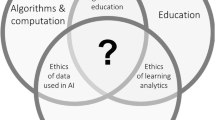Abstract
Integration of technology in all forms ofeducation has narrowed down the gap between theon- and off-campus students and has resulted inthe use of the more broad-based term`distributed learning'. Consequently, distancelearning is seen as a subset of distributedlearning, focusing on students who may beseparated in time and space from their peersand the instructor. The new forms and meaningsit is acquiring, its convergence withtraditional learning and its global impact poseseveral challenges. It has caused a seriousconcern to the governments and the qualityassurance agencies all over the world about thesafety of the national systems, legitimacy ofthe providers, protecting the public from fakeproviders, quality of the offerings etc. thecommon element being `concern for quality'.Many quality assurance agencies have respondedto this need and there is considerable dialogueabout ensuring quality in distance education.Some think that quality assurance practices fordistance education are essentially the same asthose used for traditional education. Othersargue that distance education testsconventional assumptions and hence the presentmechanisms of quality assurance are notadequate to ensure the quality of distanceeducation. This paper highlights the aspects ofdistance education that deviate so markedlyfrom what has been practiced for hundreds ofyears and argues that quality assurance ofdistance education has to be approacheddifferently.
Similar content being viewed by others
References
American Council on Education (ACE) (1996). Guiding Principles for Distance Learning in a Learning Society. Washington DC: ACE.
Council for Higher Education Accreditation (1999). Distance Learning in Higher Education. CHEA Update No. 2, online www.chea.org.
Council for Higher Education Accreditation (2000). Distance Learning in Higher Education. CHEA Update No. 3, online www.chea.org.
Council of Regional Accrediting Commissions (C-RAC) (2000). Statement of the Regional Accrediting Commissions on the Evaluation of Electronically Offered Degree and Certificate Programs and Guidelines for the Evaluation of Electronically Offered Degree and Certificate Programs. Online www.wiche.edu.
Distance Education and Training Council (DETC) (1998). Distance Education Survey. Washington DC: DETC.
Distance Education and Training Council (DETC) (2001). DETC Accreditation: Overview. Washington DC: (DETC).
Eaton, J.S. (2001). Distance Learning: Academic and Political Challenges for Higher Education Accreditation. CHEA Monograph Series, Number 1, online www.chea.org.
Jones, D.R. and Pritchard, A.L. (2000). ‘The distance education debate: The Australian view’, Change (November-December), 32-33.
Hirsch, D. (2001). E-Learning in Post-Secondary Education, Report of the OECD Seminar on E-learning, Japan.
Lester, J. (1991). ‘The impact of distance learning on the process of accreditation’, in Lenn, M.P. (eds.), Distance Learning and Accreditation: Professional Development Series. Washington DC: Council on Post Secondary Accreditation.
Marginson, S. (2002). Quality Assurance for Distance Learning: Issues for International Discussion and Action, CHEA International Seminar III on Academic Quality: Policy, Preferences and Politics. San Francisco, January 24.
Middle States Association of Colleges and Schools (MSACS) (1997). Guidelines for Distance Learning Programs. Philadelphia: MSACS.
Oblinger, D.G., Barone, A.A. and Hawkins, B.L. (2001). Distributed Education and its Challenges: An Overview. Washington DC: American Council on Education.
Phipps, R. (1999). What's the Difference? A Review of Contemporary Research on the Effectiveness of Distance Learning in Higher Education. Washington DC: The Institute for Higher Education Policy.
Quality Assurance Agency (QAA) (2002). Distance Learning Guidelines, online www. qaa.ac.uk
Salmi, J. (2000). Tertiary Education in the Twenty-First Century: Challenges and Opportunities. Washington DC: The World Bank.
Stella, A. and Gnanam, A. (2002). Assuring Quality and Standards in Higher Education: The Contemporary Context and Concerns. Bangalore: Allied Publisher. The Chronicle of Higher Education, 10/3/1999, 8/8/2000, 27/4/2001.
The Institute for Higher Education Policy (IHEP) (2000). Quality On-the-Line: Benchmarks for Success in Internet-Based Distance Education. Washington DC: IHEP.
Twigg, C.A. (2001). Quality Assurance for Whom? Providers and Consumers in Today's Distributed Learning Environment. New York: Center for Academic Transformation.
Author information
Authors and Affiliations
Rights and permissions
About this article
Cite this article
Stella, A., Gnanam, A. Quality assurance in distance education: The challenges to be addressed. Higher Education 47, 143–160 (2004). https://doi.org/10.1023/B:HIGH.0000016420.17251.5c
Issue Date:
DOI: https://doi.org/10.1023/B:HIGH.0000016420.17251.5c



